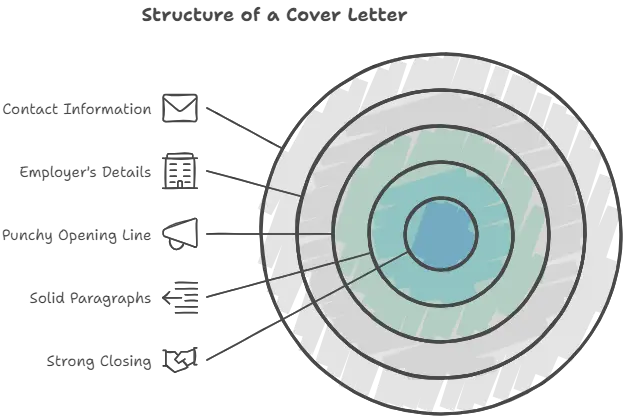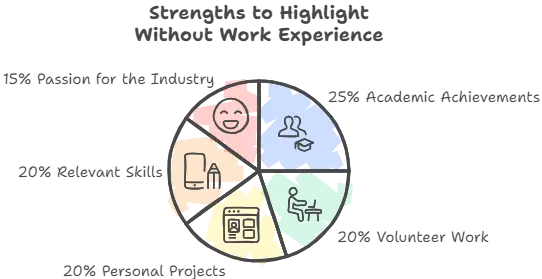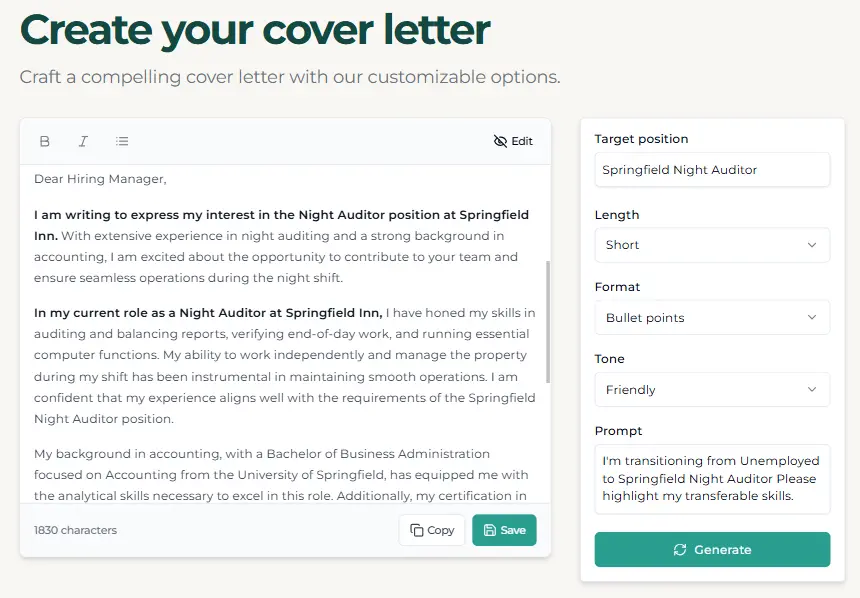
Writing a compelling cover letter without professional experience might seem impossible, but it's actually your chance to shine in ways experienced candidates can't. Your cover letter without experience should focus on transferable skills, enthusiasm, and potential rather than traditional work history.
This guide shows you exactly how to craft a cover letter that gets noticed, even when you're starting from scratch.
Why Your No-Experience Cover Letter Matters More Than You Think
When you're applying for jobs without relevant experience, your cover letter becomes your most powerful tool. Unlike your resume, which might look sparse, your cover letter tells your story and demonstrates your potential.
Hiring managers understand that everyone starts somewhere—what they're looking for is evidence of your ability to learn, adapt, and contribute meaningfully to their team.
Your cover letter bridges the gap between where you are now and where you want to be. It transforms your perceived weakness (lack of experience) into a strength by highlighting fresh perspectives, eagerness to learn, and untapped potential.
Essential Structure for a No-Experience Cover Letter
A well-structured cover letter follows a proven formula that guides readers through your story logically and persuasively.

Follow this proven structure to ensure your cover letter hits every important point:
| Section | Purpose | Length | Key Elements |
|---|---|---|---|
| Header | Professional presentation | 3-4 lines | Your contact info, date, employer details |
| Opening | Grab attention immediately | 2-3 sentences | Strong hook, position interest, enthusiasm |
| Body | Demonstrate value | 2-3 paragraphs | Transferable skills, relevant achievements, company connection |
| Closing | Call to action | 2-3 sentences | Restate interest, request interview, professional sign-off |
How to Write a Powerful Opening Without Experience
Your opening paragraph sets the tone for your entire cover letter. Instead of apologizing for your lack of experience, lead with strength and enthusiasm.
Master the art of writing compelling cover letter openings that immediately capture attention.
Strong vs. Weak Opening Examples
Strong opening example:
"As a recent marketing graduate with a passion for sustainable business practices, I'm excited to contribute fresh ideas and proven analytical skills to ABC Company's innovative environmental campaigns."
Weak opening example:
"I am writing to apply for the marketing position. Although I don't have experience in marketing, I am very interested in this role."
The difference is clear: the strong opening leads with value, connects to the company's mission, and positions lack of experience as fresh perspective rather than a limitation.
Your Transferable Skills Goldmine
Transferable skills are abilities you've developed through education, volunteering, internships, part-time jobs, or personal projects that apply to your target role.
These skills are often more valuable than industry experience because they demonstrate your fundamental capabilities.

Academic and Educational Experiences
- Group projects: Demonstrate teamwork, leadership, and project management
- Research papers: Show analytical thinking, attention to detail, and communication skills
- Presentations: Highlight public speaking, organization, and persuasion abilities
- Academic achievements: Prove dedication, time management, and goal achievement
Volunteer and Personal Experiences
- Community involvement: Shows commitment, empathy, and social awareness
- Leadership roles: Demonstrates initiative, responsibility, and people management
- Event organization: Proves planning, coordination, and execution skills
- Personal projects: Shows self-motivation, creativity, and technical abilities
According to FlexJobs' research on transferable skills, employers consistently value these abilities because they indicate how well you'll adapt to new challenges and work environments.
How to Address Your Experience Gap Strategically
Don't ignore the elephant in the room—address your lack of experience directly but positively.
Frame your inexperience as an asset rather than a liability.
The Positive Reframe Technique
Instead of saying: "Although I lack professional experience..."
Say: "As someone bringing fresh perspectives and current academic knowledge to the field..."
This technique works because it:
- Acknowledges your situation honestly
- Immediately pivots to the benefits you offer
- Positions you as an asset rather than a risk
- Shows confidence in your abilities
Example of Effective Experience Gap Addressing
"While I'm new to the professional marketing world, my recent coursework in digital marketing analytics and successful management of my university's social media campaigns have equipped me with current industry knowledge and hands-on experience with the latest tools and trends."
How to Showcase Your Potential Effectively
Potential is about demonstrating your capacity for growth, learning, and contribution.
Here's how to make your potential tangible:
Use the STAR Method for Examples
Structure your examples using Situation, Task, Action, Result:
Situation: "During my final semester, our class was tasked with developing a marketing campaign for a local nonprofit."
Task: "I volunteered to lead the research and strategy development."
Action: "I conducted competitor analysis, surveyed 200+ community members, and developed a comprehensive digital strategy."
Result: "Our campaign increased the nonprofit's social media engagement by 150% and generated 50 new volunteer sign-ups."
Quantify Your Achievements
Numbers make your accomplishments concrete and memorable:
- "Managed a team of 8 students" rather than "led a group project"
- "Maintained a 3.8 GPA while working 20 hours per week" rather than "balanced work and school"
- "Organized an event for 200+ attendees" rather than "helped with event planning"
Advanced Tailoring Strategies
Generic cover letters are easy to spot and quick to reject.
Tailoring your letter shows genuine interest and demonstrates your research skills.
If you're changing career paths entirely, learn how to write an effective career change cover letter that positions your background as an advantage.
Company Research Framework
Before writing, research:
- Company mission and values: How do your personal values align?
- Recent news or achievements: What can you reference to show awareness?
- Company culture: How does your personality fit?
- Industry challenges: How can your fresh perspective help?
Job Description Analysis
Identify:
- Required skills: Which ones do you have from other contexts?
- Preferred qualifications: How do your experiences relate?
- Key responsibilities: Where have you done similar work?
- Company priorities: How can you contribute to their goals?
Common Mistakes That Kill No-Experience Cover Letters
Avoid these critical errors that immediately mark you as inexperienced:
The Apology Trap
Don't write: "I know I don't have the experience you're looking for, but..."
Instead write: "My unique background in [relevant area] has prepared me to contribute to [specific company goal]."
The Generic Template Error
Using the same letter for every application shows lack of effort and genuine interest.
Always customize for each opportunity.
The Overcompensation Mistake
Don't try to hide your inexperience by using overly complex language or making exaggerated claims.
Be authentic and confident.
Proven Templates for Different Situations
Recent Graduate Template
Dear [Hiring Manager Name],
As a recent [degree] graduate with specialized knowledge in [relevant area], I'm excited to bring fresh insights and proven [key skill] abilities to [Company Name]'s [department/team]. Your commitment to [company value/mission] aligns perfectly with my passion for [related passion].
During my studies, I [specific relevant experience with quantified results]. This experience developed my [2-3 key skills] and demonstrated my ability to [relevant capability]. Additionally, my [volunteer work/project/internship] at [organization] allowed me to [relevant achievement with numbers].
I'm particularly drawn to [specific aspect of role/company] and believe my background in [relevant area] and enthusiasm for [industry/field] would enable me to contribute meaningfully to your team from day one.
I'd welcome the opportunity to discuss how my fresh perspective and proven abilities can support [Company Name]'s continued success.
Sincerely,
[Your name]
Career Changer Template
Dear [Hiring Manager Name],
My [number] years in [previous field] have equipped me with [transferable skills] that translate directly to success in [target field]. I'm excited to apply these proven abilities to contribute to [Company Name]'s [specific goal/mission].
In my role as [previous position], I [relevant accomplishment with numbers] by [specific actions]. These experiences developed my expertise in [transferable skills] while teaching me [relevant lesson/skill]. My background in [previous field] provides a unique perspective on [industry challenge/opportunity].
I'm particularly excited about [specific aspect of role] because it combines my proven [skill] abilities with my growing passion for [new field]. My recent completion of [relevant course/certification/project] demonstrates my commitment to transitioning into this field.
I'd appreciate the opportunity to discuss how my diverse background and fresh enthusiasm can drive results for your team.
Best regards,
[Your name]
Expert Tips for Maximum Impact
These advanced strategies will help your cover letter stand out:
The Connection Strategy
If you have any connection to the company (alumni network, mutual connections, company events), mention it naturally in your opening or closing.
The Question Technique
End with a thought-provoking question that demonstrates your understanding of the industry:
"Given the increasing importance of data privacy in digital marketing, I'd love to discuss how my research background could contribute to developing more transparent customer engagement strategies."
The Value Proposition Statement
Include one clear sentence that summarizes what you bring:
"I offer the unique combination of current academic knowledge, proven leadership abilities, and genuine passion for sustainable business practices."
For students and recent graduates specifically, consider exploring our comprehensive guide on creating an impressive resume with no experience to complement your cover letter strategy.
Tools and Resources to Streamline Your Process
Writing multiple tailored cover letters can be time-consuming. Consider using professional career resources from institutions like Harvard to guide your writing process.
For faster, more efficient cover letter creation, try our AI-powered cover letter generator that helps you create personalized, professional cover letters tailored to each job application. Professional tools can help you generate multiple versions quickly while maintaining quality and personalization.
The key is using these tools as a starting point, then customizing each letter to reflect genuine interest and research about the specific opportunity.

Proofreading and Final Polish
Your cover letter must be flawless. Even small errors can eliminate you from consideration.
Follow this systematic approach:
- Content review: Ensure every paragraph adds value and supports your candidacy
- Structure check: Verify logical flow and appropriate paragraph lengths
- Grammar and spelling: Use spell-check tools and read aloud
- Formatting consistency: Check fonts, spacing, and alignment
- Contact verification: Double-check all names, titles, and contact information
Have someone else review your letter—they'll catch errors you miss and provide feedback on clarity and impact.
Frequently Asked Questions
How long should a cover letter be with no experience?
Keep your cover letter to one page, approximately 250-400 words. Focus on quality over quantity—every sentence should add value to your candidacy.
Should I mention my lack of experience directly?
Yes, but frame it positively. Instead of apologizing for inexperience, highlight the benefits of your fresh perspective, current knowledge, and eagerness to learn.
What if I have absolutely no relevant experience?
Everyone has relevant experience—it's about identifying transferable skills from education, volunteering, personal projects, or life experiences. Focus on problem-solving abilities, communication skills, and learning capacity.
Can I use the same cover letter for multiple applications?
Never use identical letters. While you can create a strong template, always customize each letter to address the specific company, role, and requirements. Tailoring shows genuine interest and research skills.
How do I research companies effectively for tailoring?
Start with the company website, recent news articles, LinkedIn company page, and employee profiles. Look for mission statements, recent achievements, company culture information, and industry challenges they're addressing.
What's the biggest mistake people make in no-experience cover letters?
The biggest mistake is leading with apologies or focusing on what you lack rather than what you offer. Always lead with your strengths and frame your situation as bringing fresh value to the organization.